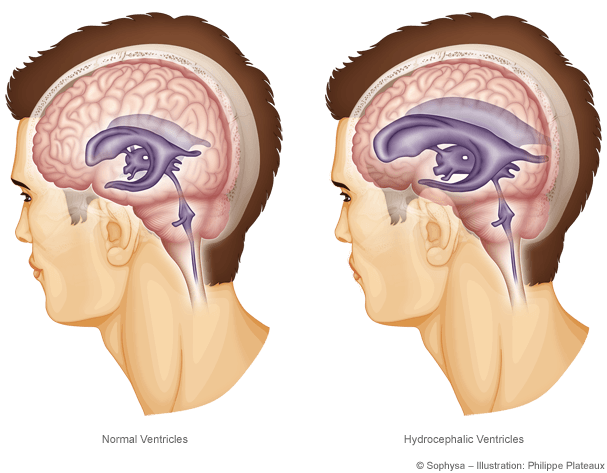
Hydrocephalus occurs when excess cerebrospinal fluid (CSF) builds up in the brain. Too much CSF causes the ventricles of the brain to expand, increasing pressure and causing damage.
Hydrocephalus can be congenital or acquired. Congenital hydrocephalus happens in the womb from conditions such as spine bifida (when the spine doesn’t properly form) or a brain malformation such as Aqueductal Stenosis, Arachnoid cysts, Porencephaly and Dandy-Walker syndrome.
Acquired hydrocephalus can occur at any age. It can be caused by stroke, brain tumour, meningitis, intracranial bleeding, head injury and other unknown (idiopathic) causes. While there are treatments available to help manage hydrocephalus, there is no permanent cure. This page is specifically about acquired hydrocephalus.
Symptoms
Symptoms of acquired hydrocephalus include:
• Chronic headaches* that may not be relieved by pain medication
• Cognitive challenges or changes in cognitive performance
• Decline in academic or work performance
• Difficulty waking up from sleep
• Incontinence
• Irritability/ personality changes
• Loss of consciousness, fainting
• Loss of coordination, motor performance or balance problems, including gait disturbances: clumsiness, difficulty walking on uneven surfaces and stairs
• Seizures
• Tiredness or difficulty staying awake
• Visual problems; blurred or double vision
• Vomiting/nausea (especially projectile in children)
In diagnosing Normal Pressure Hydrocephalus, doctors look for a telltale triad of symptoms occurring together along with increases in the size of the ventricles in the brain: mild cognitive impairment, gait disturbances and urinary incontinence.
Headaches experienced by children and adults are often at the front of the head on both sides. They are generally severe upon waking or following a nap and may be relieved by sitting up.
Effects of Hydrocephalus
Hydrocephalus in adults can be caused by a brain injury and it can cause some of the same effects as brain injury. The shunt placement can also lead to some effects such as headaches or nausea.
Not everyone will experience the same effects, but they can include:
• Attention and memory deficits
• Auditory changes
• Confusion
• Constipation
• Fine motor skill challenges
• Muscle weakness and spasticity to mild imbalance
• Seizures
• Sensitivity to external pressures (for example weather)
• Vision changes
